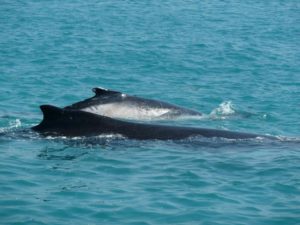Each year whales migrate up and down the length of our Australian coastline, both east and west, in their search for warmer breeding grounds. People flock to our shores during migration season in the hope to catch a glimpse of these magnificent mammals. I admit, I have been among them, both viewing from on-shore whale watching platforms and boats that take you further out to sea for a chance of closer encounters.
I have watched a mother and calf at play in the safety of the bay at Warrnabool in Victoria and I have watched a pod migrating beside our boat from the far north-west coast off Broome, in Western Australia. In my recent blog journey I discussed our travel across the Great Australian Bight at the bottom of Australia as I searched for whales. They didn't disappoint, I found them off the south-west coasts of Esperance and Margaret River.
Unfortunately, every now and then we hear about a pod of whales that has beached on a coastline somewhere around Australia or New Zealand. Then the nearby community subsequently spend hours in frantic attempts to rescue as many lives as possible. This gave me the idea for a story about a young boy living in such a community and his realisation of the importance of lending a hand.
While writing my short story 'A Whale of a Christmas Time' which will be included in the upcoming CKT Story Collection, I researched possible reasons whales may find themselves beached. I discovered several surprising possible reasons. No one can say for sure which one is correct or if they are all true. However, it is worth being aware of all of them, just the same.
- A whale may have trouble detecting a sloping sandy beach with their sonar and before they know it they have come too close. In this case the whale would panic and accidentally beach themselves as it would be too late to turn back in the ocean current. Other Whales would subsequently beach themselves when trying to come to the aid of the first whale who has already made the mistake and would be sending out a distress signal.
- A whale may be sick, have some kind of disease or be injured and may come into shallower water for refuge to heal and then become trapped in the changing tide. As social creatures, the rest of the pod will follow as they refuse to leave their sick or injured family member.
- The pod could be foraging for food or chasing prey and come too close to shore, then find themselves stuck in the incoming tide.
- Seismic underwater activity ie earthquakes, change in weather conditions, disease, unfamiliar underwater topography or magnetic field irregularities in which the sea floor spreads,, are all possible causes of disruptions to their sonar and would surely cause confusion.
No matter the reason whales find themselves caught on-shore, as long as communities continue to do everything humanly possible to prevent these horrific events as well as help these magnificent creatures when the inevitable does occur, we can't ask for anything more. Watching whales majestically swim safely out to sea unharmed is one of the greatest sights I have ever experienced. 
Have you ever had the opportunity to witness a whale and her calf playing in a bay, breaching the water as if waving to you? It's a beautiful sight. Tell me in the comments below where you were and how it made you feel?
If you are interested in reading 'A Whale of a Christmas Time,' subscribe to my newsletter for up to date information on the release date.